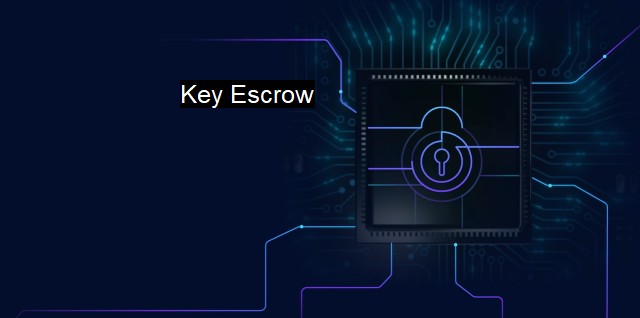What is Key Escrow?
Exploring Key Escrow: Cybersecurity, Antivirus Software, and Third-Party Security Measures
Key escrow is a security measure associated with cryptographic systems that is widely used in the realm of cybersecurity. More slightly, it refers to the third-party storage of cryptographic keys, which are foundational elements of different security protocols used to keep data secure during transit.Key escrow fundamentally works by distributing the pieces of cryptographic keys amongst multiple escrow agents that can only release the key pieces under agreed circumstances. The cryptographic keys in key escrow systems are typically very large, complex, and impossible to guess#, often consisting of hundreds to thousands of bits of data.
This system was particularly invented as a response to the increasing information age adversities where conceivably any person across the field could encode their communications, thereby making it nearly impossible for any law enforcement agency to decode. Allowing multiple trusted entities to hold pieces of the keys can essentially open an access gate into encoded communications when warranted.
The protocols specified to make use of key escrow should be highly impeccable, as the keys entail potential gateway for any unauthorized access into potentially sensitive communications. The exact nature of individual key escrow systems can vastly differ from one another, each depending on its unique goals and user base.
On a practical level, this can prove to be especially useful. For instance, should an enterprise lose the ability to decode its protected data due to the loss or corruption of a cryptographic key, a copy of the key safely stored in an escrow would enable restoration of access. This is increasingly vital in certain sectors where maintaining consistent access to secure data is pivotal to operations.
Despite its benefits, key escrow systems have met resistance across certain quarters. The principal criticism revolves around whether third parties can authentically be trusted. The idea of an “absolute trust” in a third party with key components of a security system sparks issues among critics. Fears about the security robustness of escrowable systems underpin this criticism, considering the prospect of third parties becoming potential targets for attackers seeking to decipher secure communications. The fear of potential inside jobs, authorities' misuse, and security breaches will always linger since a compromised key escrow system indicates the risk of leaking sensitive data and private communications.
Correlating key escrow to antivirus systems isn’t quite immediate since the two fields solve very distinct problems. While antivirus technologies are engineered to recognize and react against familiar malware signatures, the purpose of key escrow systems is primarily to keep cryptographic keys secure. An antivirus function may include protecting these keys when they are stored or used on maintaining computers but stays tangential to core key escrow functioning. both fields share the common objective ensuring the integrity and security of data; antivirus achieves this by shielding it from harmful entities while key escrow ensures security by methodologically managing the keys necessary for decoded access to the data.
Key escrow can be described as an essential security protocol necessary to ensure that protected data remains accessible under all circumstances. Whilst it entails unique challenges relating to the trust and safety of third parties, these risks are typically outweighed by the benefits offered, particularly for sectors reliant on consistent access to secure data. like all security measures, it must stay within a larger body of procedures to give necessary robustness. It must evolve concurrently with advancing technology development and as new risks appear, whether arising from the world of cybercrime or as a by-product of novel cryptographic systems.

Key Escrow FAQs
What is key escrow in the context of cybersecurity?
In the context of cybersecurity, key escrow is a mechanism that involves the storage of encryption keys by a trusted third party. The intent is to enable authorized entities to access encrypted data, when necessary, for legitimate purposes like law enforcement investigations or in cases of emergency.How does key escrow work in antivirus software?
In anti-virus software, key escrow refers to the storage of the encryption keys used to secure the sensitive data or communications of the antivirus user. When the user needs to decrypt the data, the software can obtain the encryption key from the escrow agent, securely decrypt the data, and present it to the user.What are some potential risks associated with key escrow?
One potential risk associated with key escrow is the possibility that the escrow agent can be hacked or otherwise compromised, which could potentially give unauthorized entities access to sensitive information. Additionally, there is the possibility that the trusted third party may misuse the keys or violate the trust placed in them by unauthorized use of the keys.How can key escrow be used to enhance cybersecurity?
Key escrow can be used to enhance cybersecurity by making it easier to access encrypted data for legitimate purposes like law enforcement investigations. When implemented correctly, key escrow mechanisms can ensure that access to sensitive information is only granted to authorized individuals or entities, which can help to prevent unauthorized access and data breaches.| | A | | | B | | | C | | | D | | | E | | | F | | | G | | | H | | | I | | | J | | | K | | | L | | | M | |
| | N | | | O | | | P | | | Q | | | R | | | S | | | T | | | U | | | V | | | W | | | X | | | Y | | | Z | |
| | 1 | | | 2 | | | 3 | | | 4 | | | 7 | | | 8 | | |||||||